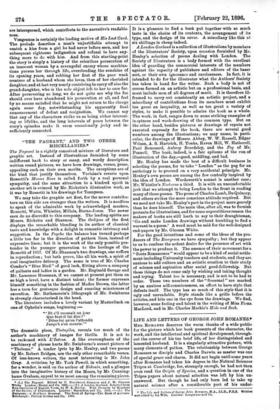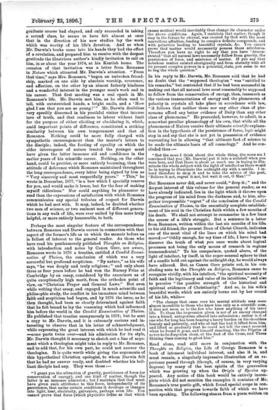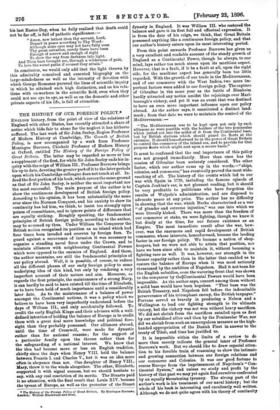LIFE AND LETTERS OF GEORGE JOHN ROMANES. 1 Mits. ROMANES deserves
the warm thanks of a wide public for the picture which her book presents of the character, the work, and the intellectual and spiritual development, through- out the course of his too brief life, of her distinguished and lamented husband. It is a singularly attractive picture, with many elements of pathos. The relationship between George Romance as disciple and Charles Darwin as master was one of special grace and charm. It did not begin until some years after Romanes had taken his degree in the Natural Sciences Tripos at Cambridge, for, strangely enough, he had not then even read the Origin of Species, and a question in one of the Tripos papers about natural selection was left by him un- answered. Bat though he had only been led to take up natural science after a considerable part of his under.
• The Life and Letters of George John Romance, M.A., LL.D., 7.5.5. Written and edited by his Wife. London: Longman, and Co.
graduate eourse had elapsed, and only succeeded in taking a second class, he seems to have felt almost at once that in the direction of his new studies lay the work which was worthy of his life's devotion. And so when Mr. Darwin's books came into his hands they had the effect of a revelation, and prepared him to receive with the deepest gratitude the illustrious author's kindly invitation to call on him, in or about the year 1874, at his Kentish home. The occasion of that invitation was a letter from Ron:tams in Nature which attracted Mr. Darwin's attention. "From that time," says Mrs. Romanes, "began an unbroken friend- ship, marked on one side by absolute worship, reverence, and affection, on the other by an almost fatherly kindness and a wonderful interest in the younger man's work and in his career. That first meeting was a real epoch in Mr. Romanes's life. Mr. Darwin met him, as he often used to tell, with outstretched hands, a bright smile, and a How glad I am that you are so young !" Mr. Darwin doubtless very speedily discerned in his youthful visitor that intense love of truth, and that readiness to labour without limit for the purpose of either eliciting or elucidating it, which, amid important points of difference, constituted a striking similarity between his own temperament and that of Romance. Nothing could be more fully charged with sympathetic encouragement than the master's letters to the disciple ; indeed, the footing of equality on which the older interrogator of nature treated the younger must have given the latter immense aid and confidence in the earlier years of his scientific career. Nothing, on the other hand, could be prettier, or more entirely becoming, than the attitude of deference which Romanes maintained throughout the long correspondence, every letter being signed by him as "Very sincerely and most respectfully yours." "This," he wrote in December, 1877, "is a bow which I specially reserve for you, and would make it lower, but for the fear of making myself ridiculous." Nor could anything be pleasanter to read than the expressions of satisfaction with which Romanes communicates any special tributes of respect for Darwin which he had met with. It may, indeed, be doubted whether two men of science, or two eminent men of different genera. tions in any walk of life, were ever united by ties more truly helpful, or more entirely honourable, to both.
Perhaps the most singular feature of the correspondence between Romanes and Darwin occurs in connection with that aspect of the former's life as to which the memoir before us is fullest of interest to the general reader. As those who have read his posthumously published Thoughts on Religion, with introduction and notes by Canon Gore, are aware, Romanes wrote in 1876 a treatise, entitled A Candid Exami- nation of Theism, the conclusion of which was a very sorrowful but profound scepticism. "By nature," as his wife says, "he was deeply and truly religious ; " and only about three or four years before he had won the Barney Prize at Cambridge by an essay, considered by the examiners as of quite exceptionally high merit, from the orthodox point of view, on "Christian Prayer and General Laws." But even while writing that essay, and engaged in much scientific and philosophic study, the conflict in his immatnre mind between faith and scepticism had begun, and by 1876 the issue, as he then thought, had been so clearly determined against faith that he felt bound to lay the reasoning which had influenced him before the world in the Candid Examination of Theism.
He published that treatise anonymously in 1878; but he sent a copy to Mr. Darwin, and it is extremely carious and in. teresting to observe that in his letter of acknowledgment, while expressing the great interest with which he had read it --some parts twice over—and his admiration for its style, Mr. Darwin thought it necessary to sketch out a line of argu- ment which a theologian might take in reply to Mr. Romanes, and to add that, for his own part, he could not answer the theologian. It is quite worth while giving the arguments of this hypothetical Christian apologist, to whom Darwin felt that he had no answer ready, and doubted whether his bril- liant disciple had any. They were these :—
"I grant you the attraction of gravity, persistence of force (or conservation of energy), and one kind of matter, though the latter is an immense admission ; but I maintain that God must have given such attributes to this force, independently of its persistence, that under certain conditions it develops or changes into light, heat, electricity, galvanism, perhaps even life. You cannot prove that force (which physicists define as that which
causes motion) would inevitably thus change its character under the above conditions. Again, I maintain that matter, though it may in the future be eternal, was created by God with the most marvellous affinities, leading to complex definite compounds, and with polarities leading to beautiful crystals, Ac. You cannot prove that matter would necessarily possess these attributes. Therefore you have no right to say that you have 'demon- strated' that all natural laws necessarily follow from gravity, the persistence of force, and existence of matter. If you say that nebulous matter existed aboriginally and frOm eternity with all its present complex powers in a potential. state, you seem to me to beg the whole question."
In his reply to Mr. Darwin, Mr. Romano said that he had no doubt that the "supposed theologian" was "entitled to his remarks," but contended that if he had been successful in making out that all natural laws must reasonably be supposed to follow from the conservation of energy, then, inasmuch as the various transmutations of energy and the phenomena of polarity in crystals all take place in accordance with law, "it follows that neither these nor any other class of phe-
nomena afford any better evidence of Deity than any other class of phenomena." He proceeded, however, to admit, in a
somewhat peculiar phraseology of his own, that while all the
phenomena of Nature receive their ultimate scientific explana- tion in the hypothesis of the persistence of force, logic might step in and say that she is not yet in possession of evidence warranting her in allowing "that ultimate fact of science to
be made the ultimate basis of all cosmology." And he con- cluded thus :—
"But the more I think about the whole thing, the more am I convinced that you [Mr. Darwin] put it into a nutshell when you were here, and that there is about as much use in trying to illu- minate the whole subject with the light of intellect as there would be in trying to illuminate the midnight sky with a candle. I in- tend therefore to drop it and to take the advice of the poet, 'Believe it not, regret it not, but wait it out, 0 Man ! '
But Romance never did, and never could, " drop it ; " and the
deepest interest of this volume for the general reader, as we have already indicated, lies in the light which it throws upon the progress of his mind from the darkness and, to him, alto- gether irrepressible "regret" of the conclusion of the Candid Examination of Theism, to the essentially complete establish- ment of his soul in the Christian faith within a few months of his death. We shall not attempt to summarise in a few lines the coarse of a life's struggle. But a sentence in a letter from Romanes, written within the last six months of his life, to his old friend, the present Dean of Christ Church, indicates one of the most vital of the lines on which his mind had moved :—" Oddly enough, for my time of life, I have begun to discover the truth of what you once wrote about logical processes not being the only means of research in regions transcendental." To his comparison, quoted above, of the light of intellect, by itself, in the super-sensual sphere to that of a candle held out against the midnight sky, he would always have adhered. But, as Canon Gore points out, in his con-
cluding note to the Thoughts on Religion, Romanes came to
recognise vividly, with his intellect, "the spiritual necessity of faith and the legitimacy and value of its intuitions," and also to perceive "the positive strength of the historical and spiritual evidences of Christianity." And so, in his wife's beautiful words, which are entirely borne out by her record of his life, while-
" The change that came over his mental attitude may seem almost incredible to those who knew him only as a scientific man, it does not seem so to the few who knew anything of his inner life. To them the impression given is not of an enemy changed into a friend, antagonism altered into submission ; rather is it of one who for long has been bearing a heavy burden on his shoulders bravely and patiently, and who at last has had it lifted from him, and lifted Bo gradually that he could not tell the exact moment when he found it gone, and himself standing, like the Pilgrim of never-to-be-forgotten story, at the foot of the Cross, and Three Shining Ones coming to greet him."
Read alone, read still more in conjunction with the Thoughts on Religion, the Life of George Romance is a book of intensest individual interest, and also it is, and must remain, a singularly impressive illustration of an ex- perience passed through (though, of course, in very varying degrees) by many of the best spirits of the generation which was growing up when the Origin of Species ap- peared. Any notice of this book would be entirely incom- plete which did not mention the examples it contains of Mr. Romance's true poetic gift, which found special scope in con- nection with that progress towards faith of which we have been speaking. The following -stanza from a poem written on
his last Easter-Day, when he fully realised that death could not be far off, is full of pathetic significance :—
" Amen, now lettest thou thy servant, Lord, Depart in peace according to Thy Word : Although mine eyes may not have fully seen Thy great salvation, surely there have been Enough of sorrow and enough of sight To show the way from darkness into light.
And Thou hast brought me, through a wilderness of pain, To love the sorest paths if soonest they attain."
In conclusion, we would only add that the light thrown by
this admirably conceived and executed biography on the large-mindedness as well as the intensity of devotion with which George Romanes pursued the lines of scientific inquiry in which he attained such high distinction, and on his rela- tions with co-workers in the scientific field, even when they could not see eye to eye, as well as on the domestic and other private aspects of his life, is full of attraction.




































 Previous page
Previous page